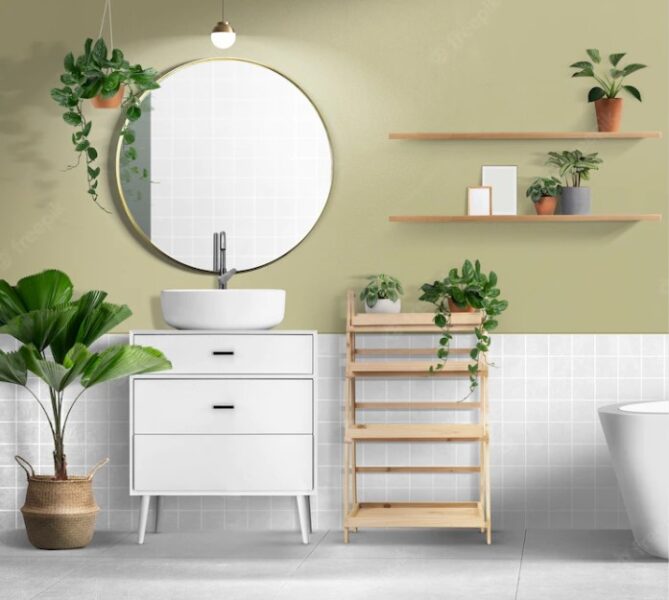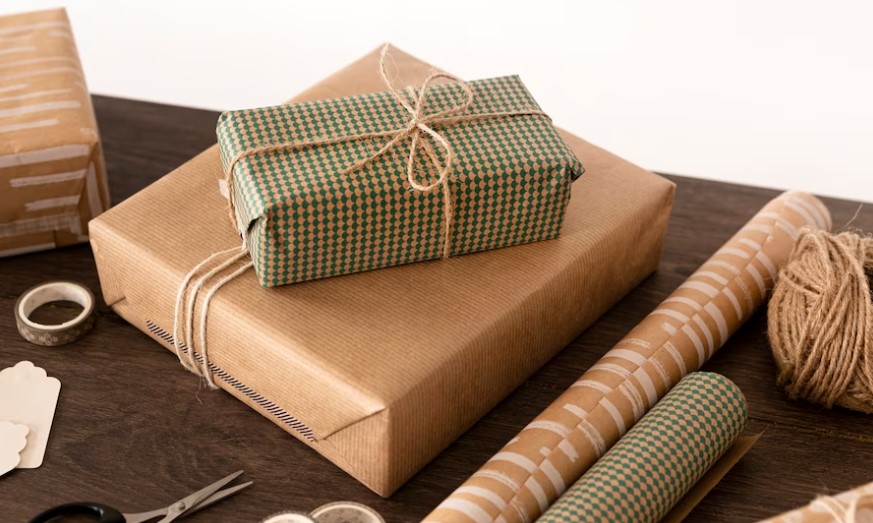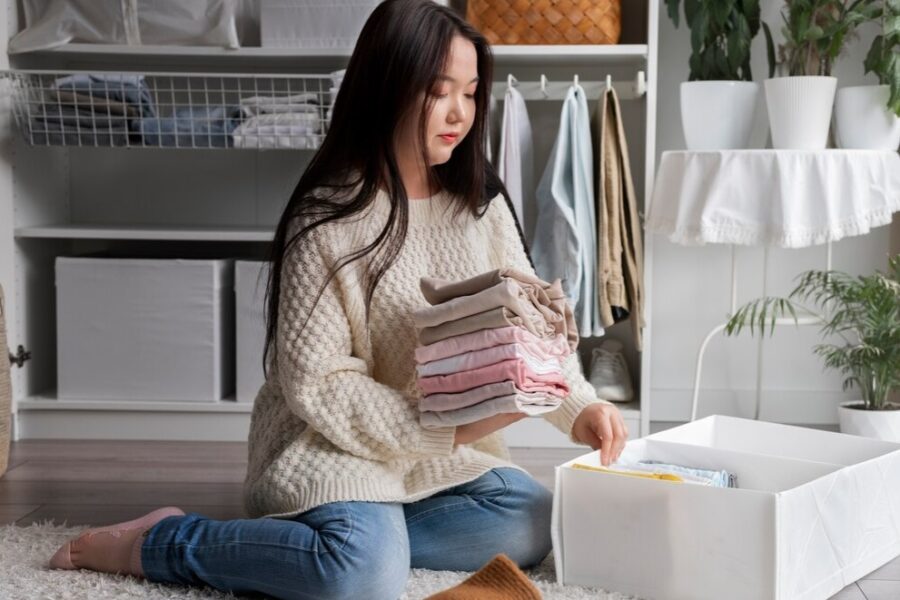
If you've been trying to lead a zero-waste lifestyle, transitioning to a zero waste bathroom might be the perfect place to start.
It may take some time and effort, but switching to a zero-waste bathroom can be rewarding. It gives you a chance to organize your cabinets and drawers, reexamine everything you use, and replace them with sustainable options.
Additionally, it allows you to clean up your space and lessen your environmental impact.
It is natural if the idea of zero waste makes you feel natural if the idea of zero waste makes you feel a bit intimidated. It's challenging to achieve zero waste. It can be a lot, requiring you to bring your containers to the grocery shop, start composting, and relearn how to clean your house. Keep reading, though, and I'll go over everything you need to know to begin designing your zero-waste bathroom.
Why does the bathroom create so much waste?
The bathroom is a significant source of household waste as items like toothpaste, toothbrushes, floss, toilet paper, shampoo, and cleaning supplies need to be replaced frequently,
They typically come in plastic or non-recyclable containers and are primarily dumped in landfills or left outside in the elements (even when they are recyclable). Even while things like 100% cotton pads may be composted, it is usual practice to send them to landfills instead because they cannot decompose there. Over time, all of this produces a large amount of landfill garbage.
Even if it may seem difficult, learning how to limit our trash gives us the chance to be more conscious. Additionally, when we choose to be more frugal with our consumption, it may also help us save money.
How to create a zero waste bathroom?
Giving yourself time to learn and get used to the new habits you will need to adapt to maintain a zero-waste waste toilet is essential since this process will be iterative. It could take time to decide which goods you should replace and which would perform best for you.
Try to keep going, and don't give up if you can't immediately find what you need or can't get rid of all the plastic in your beauty routine. Attempt to identify things that are, at the very least recyclable or reusable while looking for alternatives. Some brands even offer take-back schemes. And for a price, businesses like TerraCycle can help you get rid of unwanted plastics.
Never give up, no matter what you do. These days, several companies are attempting to provide us with better substitutes; some of them are highlighted in this article. Remember that you don't need to complete tasks flawlessly in order to have an impact.
Now that we've cleared things up, let's talk about how to start making the switch to a zero-waste bathroom:
Step 1: Declutter
Let's start by organizing your bathroom. Make a list of everything you own, keeping just what you need and use.
When it comes to cosmetic items, if you can still use them, don't toss them away. Finish them first, and then get rid of them as soon as you can.
Old expired products that can no longer be used should be sorted out and disposed of properly by recycling or reusing containers where possible. Old plastic bottles can be used to store and dispense bulk shampoo or similar liquids.
When recycling or reusing containers is an option, old, expired items that can no longer be utilized should be separated and disposed of correctly. Bulk shampoo or other liquids can be stored and dispensed from old plastic bottles.
Reducing the amount of stuff in our home is a part of achieving zero waste, so it makes sense to take a second look at any duplicates or unused items. That means your drawers and other storage spaces will be cluttered with extra towels, accessories, and bathroom supplies.
This method is essential when attempting to eliminate crashed trying to eliminate trash; this technique is necessary and will leave you feeling much better. Additionally, you will pick up a lot of knowledge that will help you in other aspects of your quest for zero waste. In general, the objective is to stick to the necessities and, where necessary, locate package-free substitutes.
Step 2. Find zero waste swaps for what you need
Here, you should consider what is still in your hands after decluttering and look for zero-waste alternatives wherever possible.
Remember that achieving zero waste also entails avoiding contact with substances that might be dangerous for the environment, you, the employees who are exposed to them, and everyone else. This covers items like cosmetics, scrub brushes, soaps, and cleaning supplies. Everything needs to be as orderly and straightforward as possible.
Since it is nearly impossible to produce zero waste, our primary goal is to select the safest alternatives that will enable us to divert as little garbage as possible from landfills. The garbage produced should preferably be biodegradable, recyclable, or both.
This is why I prepared this list of waste-free alternatives for you.
Here are our top picks for a zero waste bathroom
1. Zero Waste Toilet Essentials:
Toilet Paper
The sustainable toilet paper alternative you choose will depend on your preferences and needs. Finding recycled toilet paper packaged in biodegradable paper is essential if you want to stick to TP. The roll and wrapper may both be thrown in the compost or dumped in a landfill with the knowledge that they won't affect the environment.
You may also feel secure knowing that you have nothing to do with the massive amounts of chlorine, water, and forests needed to create generic toilet paper by choosing a sustainable brand.
Bidet
You can also use a bidet if you wish to eliminate all waste in this area. A travel-friendly bidet attachment is available to go with your toilet. If you find it difficult to completely give up toilet paper, they also provide 100% bamboo-based eco-friendly toilet paper that is sent to you in plastic-free packaging.
2. Zero Waste Personal Care (shower/bath/makeup)
Zero waste soap
One of the simplest methods to save waste in your bathroom may be to get zero waste body soap. Choose a soap that doesn't come in plastic or any other packaging that has to be disposed of in the garbage.
Your neighborhood health food store is a fantastic place to start. At mine, there are displays brimming with soap that comes with no packaging at all. All you have to do is bring your own reusable container and look for any questionable items on the ingredients list.
You may also read: 8 Best Zero Waste Body Wash Options for Sustainable Showers
Zero waste shampoo and conditioner
Your local health food store's bulk area may contain zero-waste shampoo and conditioner for you. You may also look for wholesale stores in your area; just make sure the goods they sell don't have any dangerous chemicals in them.
Here is a list of 11 best zero waste shampoos and conditioners
Zero waste tooth products
It's much easier to make the switch when it comes to mouthwash, floss, toothpaste, and toothbrushes than you would think. For toothpaste, some people just go straight for a couple of shakes of baking soda (stored in a cheese shaker).
Switch to bamboo toothbrush, Tootpaste tablets Now.

Zero waste razors
Even while they may be quite useful at times, disposable razors are undoubtedly the worst. They are headed for the trash since they do not endure very long. Reusable safety razors are the ideal zero waste substitute.
You can learn more about Sustainable Razor alternatives to make switching easier.

Zero waste make-up
With so many brands offering everything from blush and lipstick to concealer and highlighters, zero waste cosmetics has gone a long way. It's crucial to understand that achieving 100% waste reduction is impossible.
You may also like: 11 Zero-waste make brands to use
3. Reusable cloths or makeup rounds
Grab some reusable cotton rounds to solve your problem with throwaway makeup wipes. They will not only assist you in reducing your environmental impact and switching to a zero-waste bathroom, but they will also end up saving you money over time.
4. Zero waste Q-Tips
Swabs produced with cotton handles rather than plastic are also a good replacement because they can be composted. But keep in mind to take into consideration the package they come in.
5. Zero Waste Period Products
zero waste goods seem far safer than the generic, hyper-branded household brands that most of us grew up using. These name brands and similarly created items can also be harmful, in addition to stressing our wallets, waste management systems, and our ecological footprints. This is because to the fact that many of their products are a combination of synthetic, plastic, and ordinary cotton.
Follow this link to learn about the benefits of switching to sustainable period products
Step 3. Waste Audit
This is where I would do a waste audit to see what waste is still in your bathroom and how to best deal with it once you've determined which zero waste swaps are most effective for you: Recycling or composting Reuse? Landfill?
The main qualification to this is that, while achieving zero waste, it's crucial not to rely just on recycling. Simply said, recycling is unreliable. Since 1950, humans have produced an estimated 8.3 billion tons of plastic, but just 9% of all plastic garbage has ever been recycled, according to the Guardian. Because of this, the chances of us lowering our trash are really slim.
Your best hope is to choose items wisely and to purchase a compost container or establish a compost heap. Find local programs that offer compost pick-up or drop-off if you don't have anywhere to place your compost.
It's essential to keep in mind not to use your toilet as a trash can as you attempt to perfect your zero waste bathroom. While flushing toilet paper down the toilet is OK, it is not advised since it might cause septic problems. It is preferable to dispose of everything you believe should be recycled in the garbage until you can come up with the greatest zero-waste alternative.
12 Small Changes To Make Your Home More Eco-Friendly
A few final things to think about in your zero waste bathroom
I think I've covered all you need to know to get your zero-waste bathroom up and running. Whatever you do, it's important to remember that this may take some getting accustomed to, so don't give up if you don't grasp it right away.
Even the most seasoned zero-waste practitioners have a pint jar of plastic and other non-compostable items in their residences. You can do your best, but only commit to what you can keep up with. Making an effort to select waste-free options wherever feasible can help.
Sharing is caring, so if you found this post useful, please help someone by doing so.





